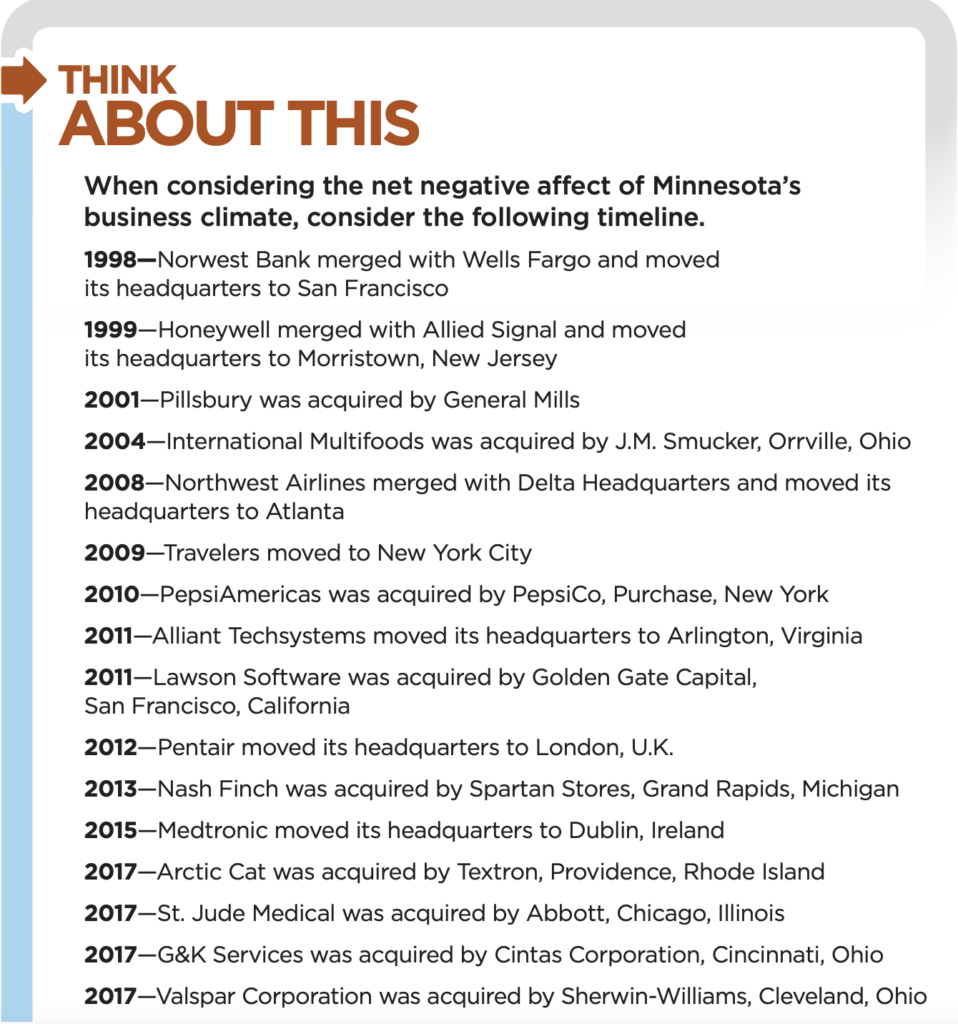Debate? Not likely
Liberal activists, especially educators, are nothing if not well schooled in hardball politics.
Senior Policy Fellow Katherine Kersten wrote a 6,000-word cover story in the fall issue of Thinking Minnesota that revealed how Edina’s schools were quietly using curriculum to indoctrinate students with extreme race-based, left-wing beliefs, beginning as early as kindergarten, and how state-based test scores in the district were suffering a simultaneous decline.
As you might expect, her story, “Whose Values? Educational excellence threatened by ideology in Edina schools,” hit a nerve in Edina, on both sides of the issue.
In October, two women, apparently furious that American Experiment had mailed the fall issue of Thinking Minnesota to every residential mailbox in Edina, stopped by our Golden Valley headquarters to fulfill a dramatic Facebook pledge that they would return a cardboard box full of unwanted magazines.
The women were personally welcomed to the Center by John Hinderaker, our president, who solicited their input about the article.
“As best I could interpret their answers to my questions, they claim that the many Edina students, parents, teachers and bus drivers who have related stories of bullying in the Edina schools are all liars,” John reported at the time. “They seemed to think that if they said the word ‘race’ over and over again, the argument must be over,” he added. “Frankly, it was rather creepy.”
And maybe a little funny/sad. In the end, they dropped a box on our lobby floor that contained just 14 magazines, many of which were decorated with profane comments.
To be candid, we expected this kind of reaction. We never thought school leaders would greet the article by saying, “Good questions! We’re glad you asked. Let’s talk about it.” Honest discourse, it seems, is no longer tolerated by liberal extremists in America, especially among educators. We expected them to respond with anger and derision—and then to try to change the subject, which they did.
Modern politicos (in both parties) advise candidates to deflect unwanted conversations by first using ad homonym attacks to undermine their interlocutors. Criticize their motives. Condemn them personally. Call them names. This kind of simple good-guy/bad-guy communications tactic will energize your base allies, say the experts, because most political apparatchiks don’t want to think; it’s easier just to hate.
Liberal activists, especially educators, are nothing if not well schooled in hardball politics. They bombarded our advertisers with a coordinated campaign of direct and indirect threats through postcards, phone calls, and emails. Anonymous callers threatened lawsuits (apparently for exercising free speech). Their Facebook echo-chambers resonated with shrill rhetoric and hateful name calling. None addressed the issue (that I could see), and none indicated that they had even read the article.
Education Minnesota, the state’s teachers’ union, retweeted a comment from someone who has spent too much time honing their humor in a fifth-grade classroom. “Keep fighting and expose them for the Koch-funded stink tank they are,” it said.
Katherine’s article was inarguably a successful effort, so much so that the strong and vocal local reaction gave her ample material for a sequel, “Undeterred and Unmanaged: Inside the obsession with ‘White Privilege’ that is roiling Edina’s public schools” (page 24). Our mission as a think tank is to pose meaningful, consequential questions in difficult circumstances, which she did. I have never been prouder to be affiliated with Center of the American Experiment. We represented voices and interests that were being bullied and silenced by the oligarchical power of the radical insiders.
Like the novels ostensibly being taught in Edina’s Pre-AP English classes, Katherine’s analysis of Edina’s curriculum was written to address far more than it at first seems. Beyond the immediate circumstances inside School District 237, her story should evoke questions from parents, educators and policymakers about what is happening in K-12 classrooms across America. Who decides these values, and on what authority? And what are the long-term consequences?
How can it be that a public-school curriculum can attempt to indoctrinate students into a particular worldview, instead of guiding them to think independently and arrive at their own opinions?
Which leads me to a personal digression. No anecdote in the “Whose Values?” piece troubled me more than the teacher who reprimanded a fifth grader during class for wearing a Donald Trump t-shirt (before she retreated to the shelter of the teachers’ lounge where, according to another teacher, she tearfully questioned whether the student’s parents were … Republicans(!)).
I don’t give a fig about the emotional issues that reduced this person to such an agitated over-reaction, but I continue to stew about the harm her behavior inflicted on the vulnerable nine-year-old entrusted to her daily care. It’s not a radical concept to suggest that teachers must protect their students from bullying behavior, not instigate it. Because his shirt offended her fragile personal political sensibilities, this teacher chose to shame a child who likely “advocated” Trump in the same spirit that his shirt the day before promoted Spiderman, or Mr. Noodle the day after. The shame belongs on her.
If nurturing students’ self-esteem still occupies an exalted priority on the agenda of public school educators, as we have been led to believe, this teacher deserved rebuke from her colleagues and discipline from her administration, neither of which were apparently forthcoming. From another perspective, imagine the in-district outrage against a teacher who might chastise a student for wearing an Obama t-shirt to class. Calls for that teacher’s suspension would likely be shouted down by calls for his or her dismissal—and I would agree.
My point: Maybe it isn’t “about the children” after all.
